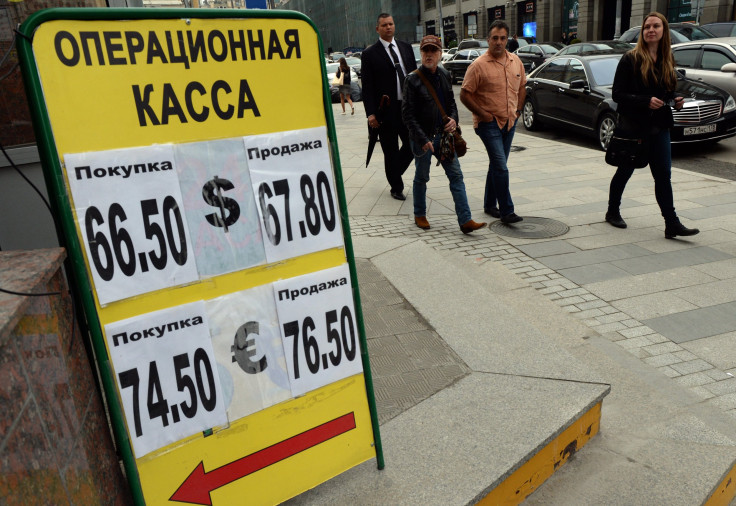Russian Economy 2015: Ruble Overvalued As Crude Oil Prices Drop, Threatening Kremlin Budget And Recession, Credit Suisse Says

Russia needs to restock its national reserves to devalue its ruble currency, an analyst from Credit Suisse said Tuesday, as reported by Bloomberg. The value of the ruble has become inflated as the price of crude oil, one of Russia's main exports, has dropped, and the country needs to devalue the currency to prevent an economic recession from deepening and deficits from widening, the analyst said.
“The revenues from oil exports need to increase, and I don’t see any other solution but through devaluing the ruble,” said Valery Pushnya, Moscow-based head of emerging markets in Europe, the Middle East and Africa at Credit Suisse Group. The imbalance has reduced revenue for the government's budget and could threaten a deficit, according to Pushnya.
Amid Russia's economie troubles, $1 has become the equivalent of 66.2 Russian rubles, compared with an average of 26.38 in recent decades and an all-time high of 72 in December 2014, Trading Economics reported.
Other analysts have noted that the devalued ruble has helped exports, albeit with a lower value. "Russian production continued to accelerate as oil producers remained profitable even in the lower-oil-price environment, helped by the effect of a weak ruble on costs and lower taxes, which decline in a lower-oil-price environment," Bank of America Merrill Lynch stated in recent research, Reuters reported.
Why $30 oil is "the key risk" for Russia's economy https://t.co/0fZuc0WKDQ pic.twitter.com/UMD08dPzMi
— Bloomberg Business (@business) November 30, 2015Russia is the world’s largest energy exporter, and oil is one of the economy’s most important gauges. Following Russia's annexation of the Crimean Peninsula last year, the European Union issued sanctions on the country, cutting off ties with one of Russia's most lucrative import regions.
The Kremlin's involvement in a continuing conflict in Syria could also be a source of economic instability, experts said. Increased military cooperation between Russia and the West may lead to increased economic cooperation as well, but it’s too early to be certain how the conflict will affect the ruble.
After Turkey downed a Russian fighter plane that it claimed had entered Turkish airspace near the Syrian border last Tuesday, Russia issued sanctions against the nation Friday. Russia imports around 20 percent of its vegetables from Turkey, and the sanctions, though economically damaging to Turkey, will also affect Russian access to food.
© Copyright IBTimes 2024. All rights reserved.












